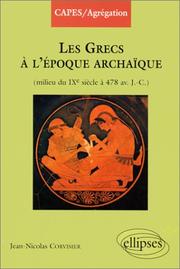| Listing 1 - 10 of 48 | << page >> |
Sort by
|

ISBN: 0435902261 Year: 1981 Publisher: London
Abstract | Keywords | Export | Availability | Bookmark
 Loading...
Loading...Choose an application
- Reference Manager
- EndNote
- RefWorks (Direct export to RefWorks)
African literature --- English literature --- -Tyrants --- Dictators --- Fiction --- Africa --- Fiction.
Book
ISBN: 1443855219 9781443855211 130630931X 9781306309318 1443851299 9781443851299 Year: 2013 Publisher: Newcastle upon Tyne
Abstract | Keywords | Export | Availability | Bookmark
 Loading...
Loading...Choose an application
- Reference Manager
- EndNote
- RefWorks (Direct export to RefWorks)
How could it happen that continental Europe became a ""Europe of the Dictatorships"" in the twentieth century? It requires some effort to understand such processes. It is insufficient to observe merely the dictatorships and their mechanisms, one must also incorporate the seemingly harmless history leading up to that time and, above all, the transitions that took place. The book begins with a description of the historical situation after the First World War. Europe's brutalization through colon...
Dictators --- Tyrants --- Heads of state --- Europe --- Politics and government
Book
Year: 2018
Abstract | Keywords | Export | Availability | Bookmark
 Loading...
Loading...Choose an application
- Reference Manager
- EndNote
- RefWorks (Direct export to RefWorks)
prints [visual works] --- costume [mode of fashion] --- tyrants --- heroes

Abstract | Keywords | Export | Availability | Bookmark
 Loading...
Loading...Choose an application
- Reference Manager
- EndNote
- RefWorks (Direct export to RefWorks)
Critias --- Athens (Greece) --- History --- Thirty Tyrants, 404-403 B.C. --- Critias, --- Crizia, --- Kritias, --- Krytiasz, --- Greece
Book
ISBN: 1316336182 1108629903 1108691870 1107115825 1107535956 Year: 2018 Publisher: Cambridge : Cambridge University Press,
Abstract | Keywords | Export | Availability | Bookmark
 Loading...
Loading...Choose an application
- Reference Manager
- EndNote
- RefWorks (Direct export to RefWorks)
This accessible volume shines a light on how autocracy really works by providing basic facts about how post-World War II dictatorships achieve, retain, and lose power. The authors present an evidence-based portrait of key features of the authoritarian landscape with newly collected data about 200 dictatorial regimes. They examine the central political processes that shape the policy choices of dictatorships and how they compel reaction from policy makers in the rest of the world. Importantly, this book explains how some dictators concentrate great power in their own hands at the expense of other members of the dictatorial elite. Dictators who can monopolize decision making in their countries cause much of the erratic, warlike behavior that disturbs the rest of the world. By providing a picture of the central processes common to dictatorships, this book puts the experience of specific countries in perspective, leading to an informed understanding of events and the likely outcome of foreign responses to autocracies.
Dictatorship. --- Dictators. --- Tyrants --- Heads of state --- Absolutism --- Autocracy --- Tyranny --- Authoritarianism --- Despotism --- Totalitarianism
Book
ISBN: 1787076814 1787076822 Year: 2018 Publisher: Oxford, United Kingdom : Peter Lang,
Abstract | Keywords | Export | Availability | Bookmark
 Loading...
Loading...Choose an application
- Reference Manager
- EndNote
- RefWorks (Direct export to RefWorks)
Fictions of African Dictatorship examines the fictional representation of the African dictator and the performance of dictatorship across genres. The volume includes contributions focusing on literature, theatre and film, all of which examine the relationship between the fictional and the political. Among the questions the contributors ask: what are the implications of reading a novel for its historical content or accuracy? How does the dictator novel interrogate ideas of veracity? How is power performed and ridiculed? How do different writers reflect on questions of authority in the postcolony, and what are the effects on their stories and modes of narration? This volume untangles some of the intricate workings of dictatorial power in the postcolony, through twelve close readings of works of fiction.
African literature --- Dictators in literature. --- Dictators --- Tyrants --- Heads of state --- History and criticism.
Book
ISBN: 0801427878 Year: 1993 Publisher: Ithaca Cornell University
Abstract | Keywords | Export | Availability | Bookmark
 Loading...
Loading...Choose an application
- Reference Manager
- EndNote
- RefWorks (Direct export to RefWorks)
Despotism --- Despotisme --- History --- Histoire --- Greece --- Grèce --- Politics and government --- Politique et gouvernement --- Grèce --- To 146 B.C. --- Age of Tyrants, 7th-6th centuries, B.C.

ISBN: 272984676X Year: 1996 Publisher: Paris : Ellipses,
Abstract | Keywords | Export | Availability | Bookmark
 Loading...
Loading...Choose an application
- Reference Manager
- EndNote
- RefWorks (Direct export to RefWorks)
Greece --- Grèce --- Civilization --- History --- Civilisation --- Histoire --- Grèce --- Age of Tyrants, 7th-6th centuries, B.C. --- Geometric period, ca. 900-700 B.C. --- To 146 B.C.

ISBN: 0472114247 9780472114245 Year: 2005 Publisher: Ann Arbor University of Michigan Press
Abstract | Keywords | Export | Availability | Bookmark
 Loading...
Loading...Choose an application
- Reference Manager
- EndNote
- RefWorks (Direct export to RefWorks)

ISBN: 3515069208 9783515069205 Year: 1996 Publisher: Stuttgart Steiner
Abstract | Keywords | Export | Availability | Bookmark
 Loading...
Loading...Choose an application
- Reference Manager
- EndNote
- RefWorks (Direct export to RefWorks)
Despotism --- Despotisme --- History --- Histoire --- Greece --- Grèce --- Politics and government --- Politique et gouvernement --- -Greece --- -Despotism --- Grèce --- Greece - History - Age of Tyrants, 7th-6th centuries B.C.
| Listing 1 - 10 of 48 | << page >> |
Sort by
|

 Search
Search Feedback
Feedback About UniCat
About UniCat  Help
Help News
News